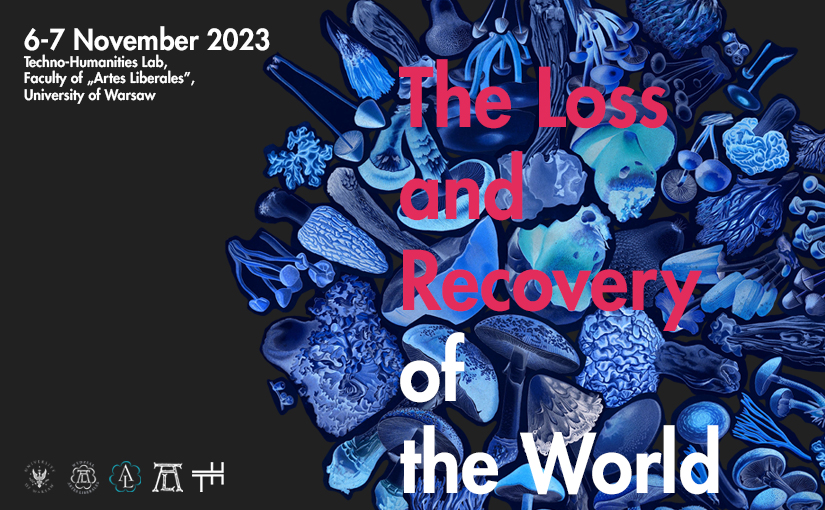Papers and panels are invited for the interdisciplinary conference, “The Loss and Recovery of the World”, which will take place in Warsaw from 6-7 November 2023. The conference is organized by the Faculty of Artes Liberales at the University of Warsaw (Poland) and is part of the „Technology and Socialization” project.
The pandemic took away our „right to” and „joy of” the world. In the short time of „closure in home”, man ceased to be a “worldly being” and became an „alone animal” re-domesticated and fully controlled by “algorithmic governmentality”. The world has become a problem, rather an “assumption” than a “reality”. The main question we would like to ask during the conference is if there’s a possibility of regaining the world and the joy derived from being in the world. Is the world still “something to live in”?
For a long time, philosophy talked about man who is “of the world” and spoke about the world which is “for man”. Regardless of whether our point of departure was Husserl’s phenomenology with the postulate that „every consciousness is the consciousness of something”, or Heidegger’s onto-theology postulating the primality of „being in the world”, or the philosophy of immanence that sees „consciousness already” in the world”. Even Alain Badiou‚s mathematical ontology studies, in its second phase, the possibility of the emergence of the world and its donations, or finally, a critical theory analyzing and following Karl Marx, the limits of commodity fetishism and the transformation of the world into a „department store” governed by the principle of generalized equivalence; well, regardless of these multiple strategies and starting points, „care for the world” remains crucial.
We ask: whether today’s philosophy is too easily reconciled with the idea of a world „without man” and „not for man”? Then, after the discussion about „things in themselves” (noumens) and „things for us ” (phenomena), we will discuss „things after man” and „freed from us”. Surely the world does better „without a man” than a man “without the world”. But does this mean, however, that philosophy in its “last step” is to become a philosophy of doom, a theory of extinction or „final disappearance”, i.e., generalized nihilism?
Was the “common world” only a particular illusion created by a small and privileged part of humanity, who wanted to justify the conquest of this world, or to reduce it to a mere „collection of variables”, or the collection of all things amenable to instrumental rationality? Has the world long been merely an energy and material resource called to reveal its as-yet-unseen treasures? Does modern set theory, refusing the concept of the set of all sets, not problematize the very concept of a “finite world” and the possibility of its closure? Is the world still to be recovered? And what kind of world would we like to regain?
At the beginning of the 20th century, György Lukács, in The Theory of the Novel, wrote – “Happy are those ages when the starry sky is the map of all possible paths-ages whose paths are illuminated by the light of the stars. Everything in such ages is new and yet familiar, full of adventure and yet their own. The world is wide and yet it is like a home, for the fire that burns in the soul is of the same essential nature as the stars; the world and the self, the light and the fire, are sharply distinct, yet they never become permanent strangers to one another, for fire is the soul of all light and all fire clothes itself in light” (Georg Lukács, The Theory of the Novel, trans. Anna Bostock, MIT Press, 1971, p. 29) Is the “happy world”, described by young Lukács, still conceivable and habitable? Is it „for us”, i.e., is it a „real possibility” for us – still “humane, all to humane”? Is the joy of „being in the world” possible at all? Or has the only possibility become „cosmic pessimism” condemning us to laments, elegies or hymns sung „after the loss of the earth”, and the only worldly mood (Stimmung) is „cosmic melancholy” as a reaction to the loss of the earth?
Presentations are expected to be between 20 and 30 minutes. Please send abstracts of up to 300 words, attached in a word document, with a short bio to technologyandsocialization@gmail.com by the 31st of August, 2023 24th of September, 2023. Should you need any further information, do not hesitate to contact us at the same e-mail address. All information related to the conference and the “Technology and Socialization” project can be found here. We are looking forward to your participation and to hosting you in Warsaw.
Organizing Committee:
Professor Szymon Wróbel
Dr Krzysztof Skonieczny
Dr Katarzyna Szafranowska
Mgr Adam Cichoń

